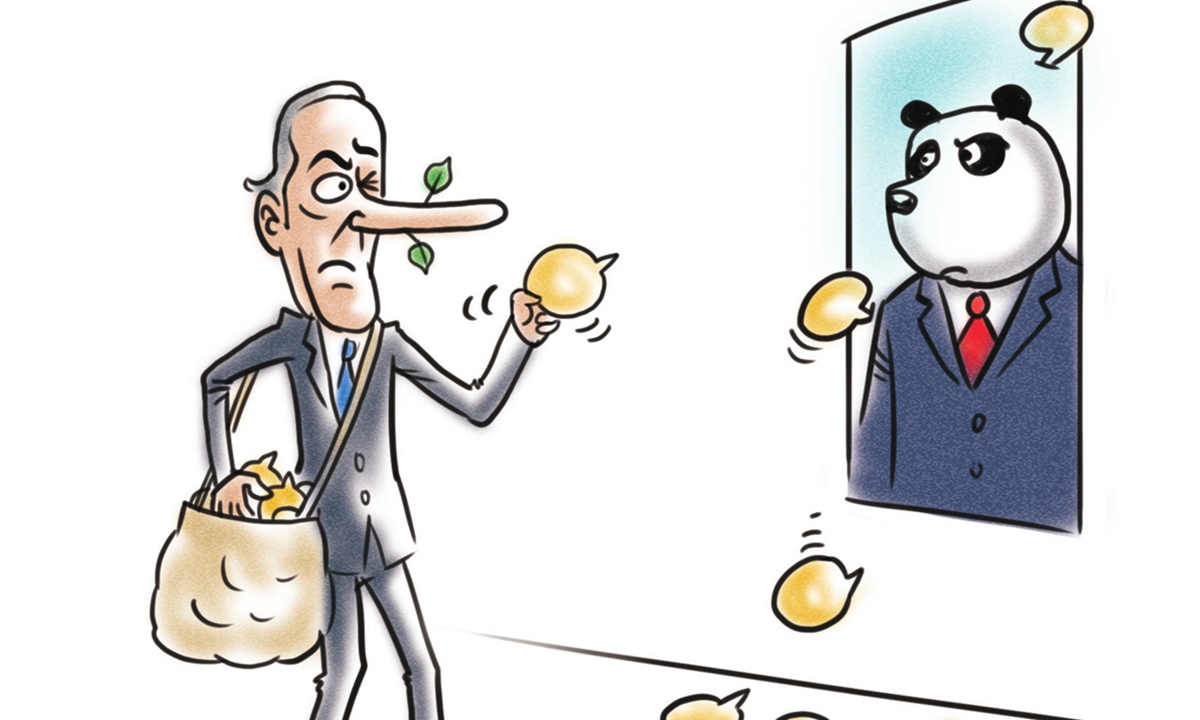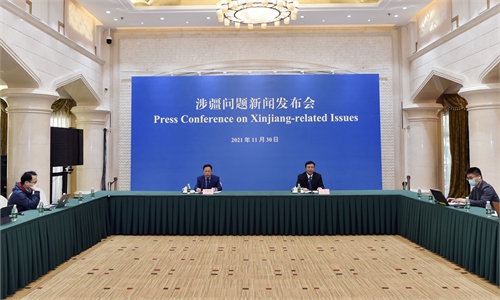Call to boycott Olympics through Xinjiang narrative is US-concerted propaganda campaign

Illustration: Liu Rui/GT
As the Winter Olympics in Beijing approaches early next year, some forces are content to stir up trouble. It has been reported that the Biden administration has already made a de facto decision to pursue a "diplomatic boycott" of the event in response to allegations made regarding China's policies in the Xinjiang Uygur Autonomous Region. Whilst athletes would be allowed to participate, US government officials or representatives would be "barred" from the event. States overtly loyal to Washington, including the United Kingdom and Australia, have contemplated similar moves.In line with this development, and following the conclusion of the Xi-Biden summit, an uncoincidental propaganda campaign has commenced in the Western media in order to ramp up criticism of China and humiliate the country. This has included so far, after a six-month absence on the matter from the Western press, a resurfacing of Xinjiang-related content with fresh angles laundered by Adrian Zenz, as well as a number of other stories hurling accusations at an above average ratio. More is lined up, with the sham kangaroo court of the "Uyghur tribunal" unsurprisingly having scheduled its results for December.
It's not obvious to many, but it should be, and nobody should be deceived by this political theater which comprises the primary US playbook on how to attack and engineer policy against a "target country" which always cynically and opportunistically weaponizes the mantra of human rights and moral obligation to incite the emotions and fears of their populations, through a benign assumption of their own supremacy, use the content as being sincerely motivated, and falsely attribute the stated goal as acting out of concern for the people in question than being a pursuit of materialistic self-interest or geopolitics.
This is the process of what is described as "Manufacturing Consent" as famously set out by Noam Chomsky. Using these value sentiments, the US justifies aggression overseas by crafting a narrative through a myriad network of think-tank "experts" and journalists, who then market and sell the policies to the broader public through the guise of impartiality, influencing the conversation and public consciousness accordingly, whipping up mass hysteria. Almost always, the theme revolves around accusing countries of grotesque atrocities and human rights abuses or sometimes extreme threats, which upon the Western notion of "universality" flags action as an urgent issue of moral concern which cannot be ignored. It successfully transforms the notions of war and sanctions from negative connotations into positive ones.
These strategies have most famously come to fruition in the era of mass media and have been employed in every US intervention and invasion of modern times. The US and their allies coupled the rhetoric of invading Iraq with a historically infamous lie that Saddam Hussein "possessed weapons of mass destruction" whilst Gaddafi in Libya and Assad in Syria were accused of the wholesale slaughter of their own populations pushing the idea that these wars were not geopolitically motivated regime changes, but a bid to "protect people."
Yet the most jarring aspect of this manipulation is that it is hypocritical and selective, which proves its fallaciousness. When it does not suit the agenda, credible allegations of mass atrocities or humanitarian crises in other countries are ignored. For example, whilst preaching to the public about Xinjiang, the Western mainstream media imposes a blackout of the US-backed conflict in Yemen, as well as Modi's growing abuse of ethnic minorities in India. Not every expert or dissident gets an unbridled media platform to make their voice heard, and there is a significant reason why.
And in line with this, the US position on Xinjiang has long been a relentless opportunistic and concerted propaganda campaign which has been designed to manufacture moral consent and legitimacy for hostile policies against China. Throughout the Trump and Biden administrations, Xinjiang is a "button" which has been switched on and off at various times in lieu of various goals. This has included to legitimate sanctions against strategic Chinese companies, to force other countries to take sides, to drive a wedge in China's relations with Europe (it played a critical role in undermining the Comprehensive Agreement on Investment), as well as using allegations of forced labor to supplement US protectionist goals, such as attempting to undercut China's dominance in solar panel production. Now, after shelving it for most of 2021, the issue is back in order to manufacture a boycott of the Olympics. The Western public hear the word "genocide" and are filled with their sense of moral exceptionalism that they switch off and fail to think critically about how the terminology and allegations are being used to emotionally manipulate them.
But the world must wake up. America is a country which aggressively and unapologetically propagates lies under the guise of moral concern in order to disguise what is on paper the most aggressive foreign policy in human history. Until the world understands how this system works and manipulates people, they will continue to fall for the rhetoric. The frontloading of Xinjiang content specifically for the end of this year should ring alarm bells.
The author is a British political and international relations analyst and a graduate of Durham and Oxford universities. opinion@globaltimes.com.cn

Illustration: Liu Rui/GT
As the Winter Olympics in Beijing approaches early next year, some forces are content to stir up trouble. It has been reported that the Biden administration has already made a de facto decision to pursue a "diplomatic boycott" of the event in response to allegations made regarding China's policies in the Xinjiang Uygur Autonomous Region. Whilst athletes would be allowed to participate, US government officials or representatives would be "barred" from the event. States overtly loyal to Washington, including the United Kingdom and Australia, have contemplated similar moves.In line with this development, and following the conclusion of the Xi-Biden summit, an uncoincidental propaganda campaign has commenced in the Western media in order to ramp up criticism of China and humiliate the country. This has included so far, after a six-month absence on the matter from the Western press, a resurfacing of Xinjiang-related content with fresh angles laundered by Adrian Zenz, as well as a number of other stories hurling accusations at an above average ratio. More is lined up, with the sham kangaroo court of the "Uyghur tribunal" unsurprisingly having scheduled its results for December.
It's not obvious to many, but it should be, and nobody should be deceived by this political theater which comprises the primary US playbook on how to attack and engineer policy against a "target country" which always cynically and opportunistically weaponizes the mantra of human rights and moral obligation to incite the emotions and fears of their populations, through a benign assumption of their own supremacy, use the content as being sincerely motivated, and falsely attribute the stated goal as acting out of concern for the people in question than being a pursuit of materialistic self-interest or geopolitics.
This is the process of what is described as "Manufacturing Consent" as famously set out by Noam Chomsky. Using these value sentiments, the US justifies aggression overseas by crafting a narrative through a myriad network of think-tank "experts" and journalists, who then market and sell the policies to the broader public through the guise of impartiality, influencing the conversation and public consciousness accordingly, whipping up mass hysteria. Almost always, the theme revolves around accusing countries of grotesque atrocities and human rights abuses or sometimes extreme threats, which upon the Western notion of "universality" flags action as an urgent issue of moral concern which cannot be ignored. It successfully transforms the notions of war and sanctions from negative connotations into positive ones.
These strategies have most famously come to fruition in the era of mass media and have been employed in every US intervention and invasion of modern times. The US and their allies coupled the rhetoric of invading Iraq with a historically infamous lie that Saddam Hussein "possessed weapons of mass destruction" whilst Gaddafi in Libya and Assad in Syria were accused of the wholesale slaughter of their own populations pushing the idea that these wars were not geopolitically motivated regime changes, but a bid to "protect people."
Yet the most jarring aspect of this manipulation is that it is hypocritical and selective, which proves its fallaciousness. When it does not suit the agenda, credible allegations of mass atrocities or humanitarian crises in other countries are ignored. For example, whilst preaching to the public about Xinjiang, the Western mainstream media imposes a blackout of the US-backed conflict in Yemen, as well as Modi's growing abuse of ethnic minorities in India. Not every expert or dissident gets an unbridled media platform to make their voice heard, and there is a significant reason why.
And in line with this, the US position on Xinjiang has long been a relentless opportunistic and concerted propaganda campaign which has been designed to manufacture moral consent and legitimacy for hostile policies against China. Throughout the Trump and Biden administrations, Xinjiang is a "button" which has been switched on and off at various times in lieu of various goals. This has included to legitimate sanctions against strategic Chinese companies, to force other countries to take sides, to drive a wedge in China's relations with Europe (it played a critical role in undermining the Comprehensive Agreement on Investment), as well as using allegations of forced labor to supplement US protectionist goals, such as attempting to undercut China's dominance in solar panel production. Now, after shelving it for most of 2021, the issue is back in order to manufacture a boycott of the Olympics. The Western public hear the word "genocide" and are filled with their sense of moral exceptionalism that they switch off and fail to think critically about how the terminology and allegations are being used to emotionally manipulate them.
But the world must wake up. America is a country which aggressively and unapologetically propagates lies under the guise of moral concern in order to disguise what is on paper the most aggressive foreign policy in human history. Until the world understands how this system works and manipulates people, they will continue to fall for the rhetoric. The frontloading of Xinjiang content specifically for the end of this year should ring alarm bells.
The author is a British political and international relations analyst and a graduate of Durham and Oxford universities. opinion@globaltimes.com.cn


